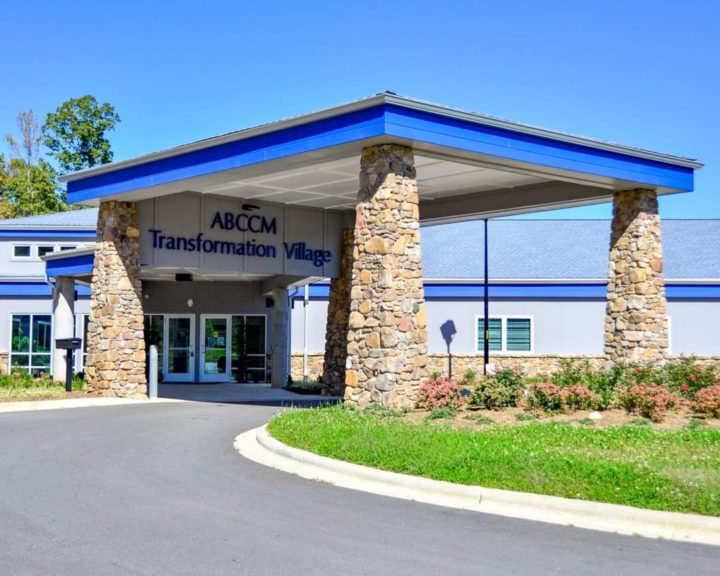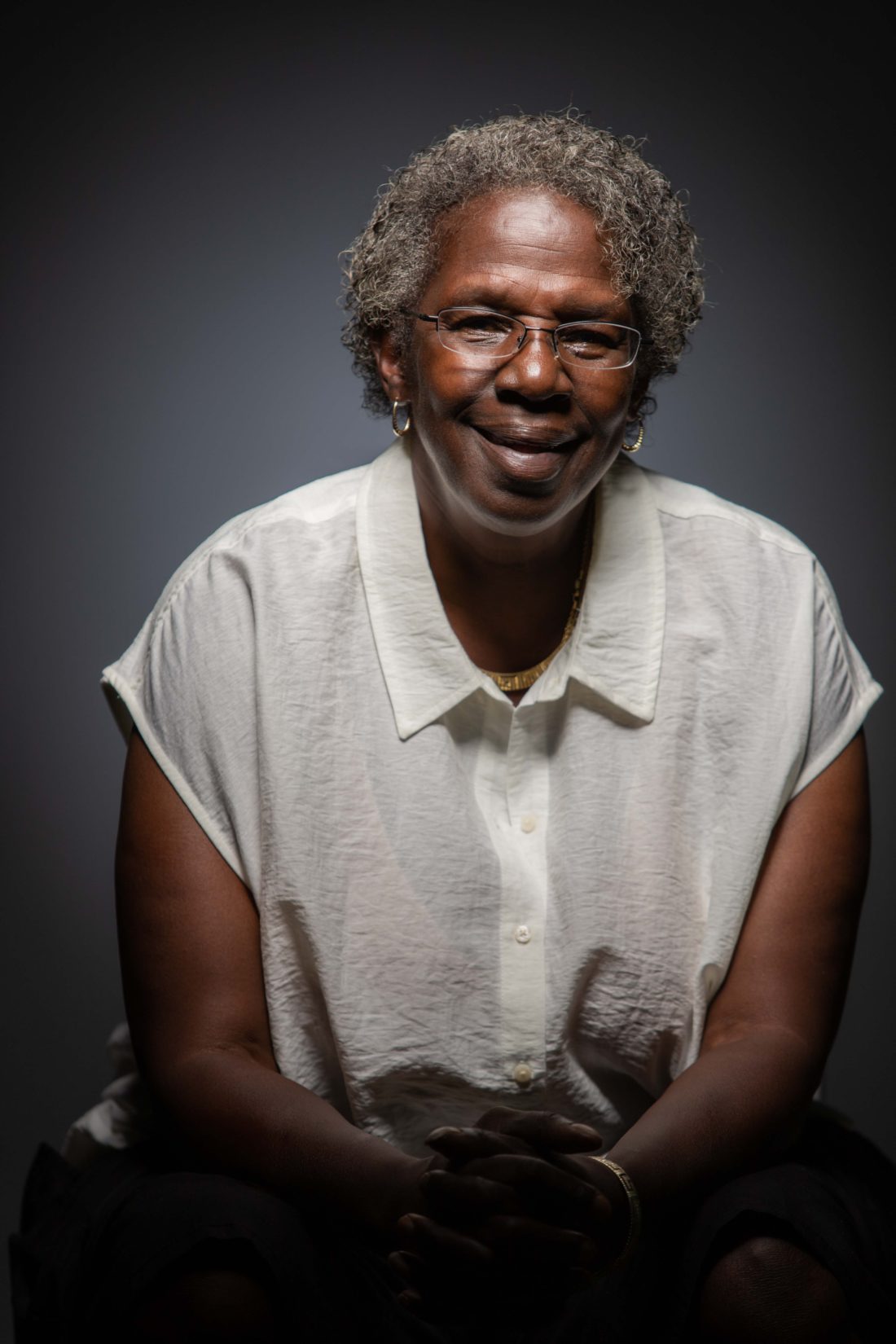After a 10 1/2-hour bus ride from Portsmouth, Va., Janis Thompson arrived in Asheville on a Monday night in September 2022 with all her belongings packed into a single suitcase. An Army veteran who served six years in Germany, St. Louis and Washington, D.C., Thompson was homeless, battling drug addiction and suffering from military sexual trauma (MST).
Thompson made the long trip to Asheville never having set foot in the city. She was in Safe Harbor, a residential addiction treatment program in Portsmouth when she heard through word-of-mouth about Transformation Village, a residential campus run by Asheville Buncombe Community Christian Ministry (ABCCM).
Up to that point, Thompson had sought help through a variety of resources offered by the U.S. Department of Veterans Affairs — therapy, medications, stints in VA residential wards – but nothing really stuck. So, Thompson applied to Transformation Village and, after a phone interview, was accepted. Then she got on the bus.
“I didn’t know what to expect,” Thompson says.
One thing she quickly learned was she was not alone.
The 2023 U.S. Department of Housing and Urban Development’s annual homelessness assessment report counted 777 homeless veterans in North Carolina. In largely urban areas like Asheville, the report estimated that women veterans accounted for 8% of the homeless population.
Buncombe County’s January 2024 Point-in-Time (PIT) count tallied 739 unhoused people, with 520 people in shelters or transitional housing and 219 people without shelter. Overall, 191 were veterans.
“Female veterans usually make up about 10% of [Transformation Village’s] population,” says the Rev. Scott Rogers, executive director of ABCCM.
In addition to the severe trauma from sexual and domestic violence that other homeless women encounter, homeless women veterans also experience a sense of abandonment that is specific to their demographic, Rogers says.
“What female veterans have in common with male veterans is they were part of a tribe, a larger family with a greater purpose. And when they’re released from the military, [there’s] a significant sense of loss … of no longer being a part of this greater purpose,” he says. “[It] adds an additional layer that makes it hard to cope.”
Complicating matters is the fact that women have to work just as hard, if not harder, than their male counterparts in the military, Thompson says.
“You have to be just as tough as guys are,” she says. “[If] guys see you fall behind, [they say], ‘Look, she can’t even run.’” The Army’s “tough it out” approach proved detrimental to Thompson’s mental health years later, when she struggled with her aversion to seeking help.
“When it comes to getting help, we want to do it like we did in the military, ” says Thompson about her fellow veterans. “Keep your head up and keep marching forward.”
Military assault
Born in Fort Knox, Ky., into a military family, Thompson enlisted in the Army in 1977 at age 20.
Thompson became an Army switchboard operator and cable installer. Her first stint was in Germany, where she felt out of place and alienated.
“It was kind of scary being there by yourself and so far away from home,” Thompson says. “I didn’t know the language.” She was glad to get back to the States, but while she was stationed in St. Louis, a male soldier raped her. She was 22 years old.
Thompson turned the rapist in, but the outcome from the attack didn’t instill confidence in how the military handled assault cases like hers.
“They reached out to me, [but] for some reason they said they didn’t need me to testify,” Thompson says. “I was told he went to jail. I’m not quite sure.” She encountered her rapist once more during her service.
“I broke into a full sprint,” she says.
The Army offered counseling to Thompson, and she saw a therapist only twice. Looking back on her treatment, Thompson says it didn’t really help. She couldn’t help feeling that the attack was somehow her fault, an assumption that was subtly reinforced by the Army’s male-dominated culture. Sex assaults in the military, she discovered, were far more prevalent than she thought.
“I started talking to other women that were in the Army,” Thompson says. “I came to find out that it happened to a lot of them. It was like, don’t try to do something [about it], or it will come back on you. Keep on marching.” According to the Department of Veterans Affairs, a third of female veterans in the VA health care system report experiencing MST.
Convinced that therapy had done all it could do for her, Thompson transferred to Washington, D.C. As soon as she was on the flight to Washington, however, Thompson knew something was wrong.
“It was an enclosed environment, and I didn’t know who was behind my back,” She says. “A guy looked at me, and I was like, ‘Oh, my goodness, it’s going to happen again.’”
Trauma symptoms
In Washington, Thompson started working at the Pentagon. She loved the job, but she started experiencing symptoms from MST. She had nightmares, was easily startled and grew increasingly paranoid.
“I didn’t want to be in a crowd,” Thompson says. “I didn’t trust men who were 6 feet tall.” She started taking heroin to cope.
Again, Thompson sought mental health treatment, but drugs won out. In 1982, at the age of 26, Thompson received an honorable discharge. She continued to use heroin after leaving the Army and fell into a spiral of addiction and unsuccessful treatment.
“I got some pretty good jobs, but I was still using [drugs],” Thompson says. She reckons she went to the mental health care ward at Hampton VA Medical Center in Virginia 10 times, sometimes of her own volition and other times sent by court order. For two years in the mid-1990s, she transferred to Salem Veteran Affairs Medical Center in Virginia. While there, she trained to be a geriatric nurse assistant at Roanoke Community College. In the meantime, Thompson was finally diagnosed with PTSD and MST, and started getting medication to treat her trauma.
“When I got out, I kept using the street drugs instead of the medication,” Thompson says. Drugs took a toll on her finances as well as her health.
“I didn’t have credit or I couldn’t keep enough money in order to get an apartment,” Thompson says. She moved from one rooming house to another. After the owner of a house where she was renting a room decided to sell, she found herself homeless at the age of 63.
Thompson finally checked back into the mental health care ward at Hampton VA Medical Center. She was transferred to Safe Harbor’s addiction and substance use program in nearby Portsmouth. As the 65-day program drew to a close, Thompson faced the prospect of being homeless again. So, she applied to Transformation Village and boarded a bus to North Carolina.
Rules, regulations and chores
After being housed in a hotel for a week, Thompson was met by Transformation Village staff members who brought her to the facility on Sept. 19, 2022. It proved to be a good fit.
“When I got there, I had made up my mind to quit [heroin],” Thompson says. “[Transition Village] showed so much love and acceptance, and you had your freedom. That just showed how much they trusted me.”
Transformation Village provides transitional housing for homeless women, including single women, mothers with children and women veterans. But housing is not the only service the campus provides, says Rogers. Once residents’ basic needs are met — food, safety and shelter — Transformation Village offers life skills training and education and certifications designed to lead to living-wage jobs and permanent homes.

that leads residents to permanent homes. Photo by Lori Seger
“It was so clean and neat, and they had rules, regulations and chores,” Thompson says of the facility.
“Those chores are part of our work-readiness training,” Rogers says. “Can you show up on time, stay on task, complete assignments independently and responsibly take initiative?” Besides lending structure to residents’ lives, the work and rules regimen helps residents become employable through life skills building, says Rogers.
The work program ties in with ABCCM’s Steps to Success, four phases that Rogers says contribute to Transformation Village’s success rate in reintegrating residents into the community. Thompson achieved the first step, stabilization, early in her tenure at the facility.
“I knew it took a made-up mind in order to stay clean,” Thompson says. So, she took advantage of Alcoholics Anonymous (AA) meetings held on campus. Other clinical recovery programs offered on-site include Celebrate Recovery as well as AA and Narcotics Anonymous. ABCCM also partners with outpatient treatment programs like the Women’s Recovery Center, RHA Health Services, the Salvation Army and October Road.
“We have trauma-informed training for all staff and volunteers [to help] those coping with violence and serial trauma,” Rogers says.
Learning life skills
The second of Transformation Village’s steps to success is life skills training, where the campus offers residents over 60 volunteer courses. Thompson picked Bible studies as well as classes on codependency and conflict resolution.
The facility also partners with A-B Tech to offer educational and professional training certifications for construction, information technology, certified nursing assistants, small manufacturing and other vocations. Rogers says Transformation Village collaborates with over 150 employers for job training.
For the facility’s final step to success — reintegration leading to permanent housing — Thompson took the initiative. On Oct. 17, 2022, she was hired as Transformation Village’s resident assistant. Next, she decided to buy a car, but that first required renewing her driver’s license.
“I hadn’t had a driver’s license in 17 years,” Thompson says. “I kept trying to do [the test] on the computer and I kept failing because it was confusing.” Frustrated with the online process, she went down to the DMV, took the test in person and scored 100%.
“I got my driver’s license and then I bought a car two days after I got my license,” Thompson says. On Aug. 4, 2023, after living less than a year in the program’s housing, Thompson got her own place. Working with local nonprofit Homeward Bound, Transformation Village helped Thompson get an apartment in Asheville.
“[Homeward Bound] pays 50%, and I pay the other 50%,” says Thompson, who continues to work at Transformation Village. Despite her perseverance in overcoming addiction and homelessness, Thompson is quick to credit Transformation Village, the program and the people who helped her put her life back on track.
“The staff loved me until I could learn how to love myself,” Thompson says.




Before you comment
The comments section is here to provide a platform for civil dialogue on the issues we face together as a local community. Xpress is committed to offering this platform for all voices, but when the tone of the discussion gets nasty or strays off topic, we believe many people choose not to participate. Xpress editors are determined to moderate comments to ensure a constructive interchange is maintained. All comments judged not to be in keeping with the spirit of civil discourse will be removed and repeat violators will be banned. See here for our terms of service. Thank you for being part of this effort to promote respectful discussion.